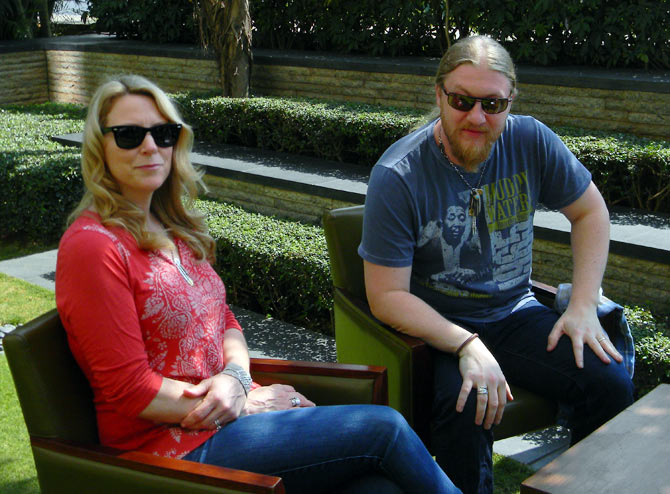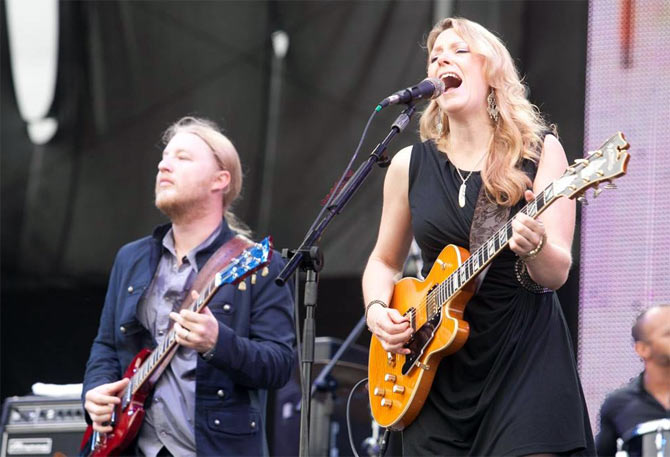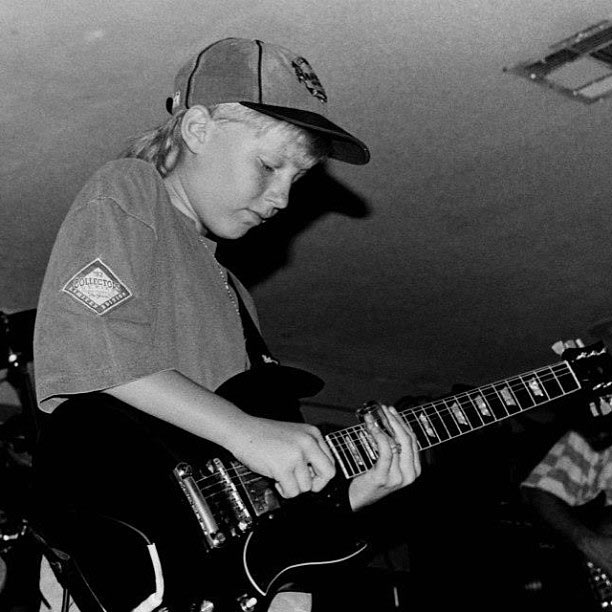Photographs: Sumit Bhattacharya/Rediff.com Sumit Bhattacharya
Total fanboy Sumit Bhattacharya buttonholes multiple Grammy-winning blues guitar hero Derek Trucks and singer Susan Tedeschi into an interview before the husband-wife duo perform at the Mahindra Blues Festival in Mumbai on Saturday
To the world of the six-string convert, Derek Trucks, 34, needs no introduction.
Derek, nephew of legendary jam-band The Allman Brothers' drummer Butch Trucks, started playing guitar when he was 9 years old.
By age 13 he was being hailed as a prodigy, sitting in with everyone from BB King to Bob Dylan, and the successor to the late great slide guitar player Duane Allman.
Derek has repeatedly been featured on Rolling Stone's lists of the 100 greatest guitar players of all time, toured the world with the likes of Eric Clapton, and is generally considered the future of blues guitar.
His distinctive slide guitar style is very, very similar to what Indian classical musicians call the gayaki ang, or imitating the human voice.
The Indian classical connection is real, because Derek learned the sarod briefly from the late maestro Ali Akbar Khan -- the maestro's son Alam Khan is Derek's friend and has played on his albums too.
Four years ago, Derek wedded family and music together, forming the Tedeschi Trucks Band with his blues singer wife Susan Tedeschi and nine other musicians, including a horn section and some members of his older band, The Derek Trucks Band.
The DTB had already won a Grammy, and the Tedeschi Trucks Band's debut album, Revelator, also won a Grammy.
In a freewheeling conversation before they took the stage at the Mahindra Blues Festival in Mumbai over the weekend -- which also features blues big names like Doyle Bramhall II and Jimmie Vaughan, not to forget Indian blues warriors from Shillong, Soulmate, and Mumbai guitar hero Warren Mendonsa's Blackstratblues -- Derek and Susan spoke to Rediff.com about music, life, family, mind expanders, and whether music can change the world.
Derek, you started playing guitar at 9 years of age and by age 13 you were sitting in with people like BB King. How did that happen? Were there a lot of musicians around the house, or did you watch The Allman Brothers rehearse or what?
Derek: Listening to records and sitting in with blues bands -- just kind of doing it, you know!
Susan: I think people discovered him, people like (Grammy-winning producer) John Snyder gave him lot of opportunities as well, to play with a lot of great legends. He got to play with people like The Band, people like (blues harp giant) Junior Wells, when he was a baby!
Derek: It's been an amazing run that way. We've gotten to play with a lot of our heroes and have real, substantial musical conversations. Which is more than you could ever ask for, really.
Derek you grew up in Florida, and (legendary bass player the late) Jaco Pastorius was from Florida. Even in his music you can hear the intermingling of cultures, a lot of Cuban influence for instance. Do you think growing up in Florida helped make your sound more global so to speak?
Derek: I think so. The music we make is a direct response to what we grew up listening to.
So when I was growing up in Jacksonville, at a time where there were still remnants of that blues-rock scene. So yeah, that music was always in the house, lot of different music, cultural collisions.
In Boston it's like that too with Berklee (College of Music). They're kind of hotbeds in the States for music.
What about you, Susan?
Susan: I grew up in Norwell, Massachusetts, 30 minutes from Boston and people know it mostly because that's where Zildjian cymbals are made. I grew up around the Zildjian family.
I think (it was important to be) growing up in a culture where music is available at record stores -- if you sought out music you could discover stuff that you never imagined. For me it wasn't until after college even that I discovered a lot of music that inspires me the most -- even though I've been on stage since I was 5 or 6 years old.
I still feel like I'm learning every day, and Boston gave me a lot of beautiful insight into how many different cultures there are, and types of music. And if you keep searching you'll find things that inspire you. For me it was blues and gospel.
When Derek and I met we connected on all those similar subjects. You know, people like (gospel singer) Mahalia Jackson and artists like (blues giants) Freddy King and Otis Rush.
'I would rather hear somebody with a unique voice than just skill'
Image: From left, Troy 'Trombone Shorty' Andrews, Jeff Beck , Derek Trucks, Gary Clark Jr and BB King perform at the White House for Black History Month, February 21, 2012.Photographs: Chris Kleponis/Reuters
How did the two of you meet? Was it at an Ali Akbar Khan concert?
Susan: No. My band was opening for The Allman Brothers in the summer of '99.
Derek was playing with The Allman Brothers (he has recently announced his decision to quit that band) and we ended up hanging out that summer.
He brought me to my first Ali Akbar Khan concert!
Derek: One of our first dates.
Susan: He introduced me to Ali Akbar Khan and I was really blown away by the music and the culture and really just followed him.
Derek, as a guitar player, how important is skill and how important is having a unique voice? Because you have both.
Kind of equally important... I would rather hear somebody with a unique voice than just skill, if I had to choose one or the other.
But my favourite is when there's both operating at the same high level.
When you hear a great voice and you can feel the soul at the same level -- that's what you want to hear.
But some of my favourite musicians are just totally raw.
I don't know where you would quantify the skill level… When I hear Howlin' Wolf singing, that's all I need (laughs)!
Much better than hearing somebody (who) sounds like they sat in a room practising all day -- I don't really wanna hear that!
Derek, your mingling of the blues with Indian classical is probably what makes you unique. Was there a eureka moment when you discovered the connection?
When I first heard Ali Akbar Khan, it was a eureka moment. It was just so lyrical and beautiful and powerful. You know, precise, and it sounded like a human voice to me.
Those melodies were so strong that it reminded me of some of the greats like (early blues-gospel singer) Blind Willie Johnson -- it just hit me the same way, so I had that little connection.
And then listening to Nusrat Fateh Ali Khan and someone like Bukka White -- their inflections were a world away, but somehow similar. It's folk music operating on a really high level.
It hit me that music essentially is just the human story and human condition coming out in different ways -- it could be a plantation in Mississippi or it could be the back woods in India or whatever. People need the same things.
That was it for me, hearing certain seminal artists like that, and making those small connections.
(Jazz-fusion drummer) Jeff Sipe turned you onto Ali Akbar Khan, is it?
Derek: Yes, Jeff and (surrealist musician) Colonel Bruce Hampton.
'Entertainment and pop music, that's another thing, that's separate'
Image: Derek Trucks and Susan Tedeschi in concertPhotographs: Courtesy Tedeschi Trucks Band's Facebook page
Derek, Carlos Santana calls you the 'anointed one' and Clapton in his autobiography calls you and Doyle Bramhall II (who is performing with the Tedeschi Trucks Band in Mumbai) keepers of the flame, so to speak. How seriously do you take that? Are you a man on a mission?
Derek: Yeah. We take the work very seriously.
We realise there's not a tonne of artists doing what we're doing, I wish there was more.
But you don't take that stuff to heart too much.
It's humbling to hear those guys say that.
As a band and as an artist we take the work very seriously and that's why we tour as much as we do, that's why we make as many records as we do. Because we feel like it's important to carry that on.
If guys like that feel that in some way you're carrying the torch then you have to keep the music at a certain level, you can't let it dip.
And those guys are great examples of that.
BB King is a great example of that. Obviously he doesn't have to tour as much as he does. But I think he knows that it's good for the world so he does it.
So being around guys like that, or (country singer) Willie Nelson, you realise that… (you have a duty).
It's tough being away from home and you'd like to relax more but this is what we do and we're lucky to be able to do it.
Susan: Absolutely.
Derek: But it's good work (laughs)!
Susan: And music is healing, and people need to be healed.
You truly believe that?
Derek: Absolutely, I mean it changed us!
Susan: And people come and tell us that. If we're healing one person, it's better than anything that you can do in your life.
Derek: I remember growing up hearing certain sounds and certain records that just make you feel differently about the world after that, you know!
I think that happens culturally.
I come from the (American) Deep South, and it wasn't that long ago that things were really awful. It's still crazy! But when people heard Ray Charles on the radio and didn't realise what colour he was and they'd fallen in love with that music and that voice... Racist people would just see him and it changed them a little bit, you know.
They had this connection that didn't think they could have.
It happens that way with world music, I believe. People hear certain voices and it just makes it human.
It kind of takes the 'otherness' away from it. I feel music does that on a lot of levels -- without people even knowing it.
Entertainment and pop music, that's another thing, that's separate. But real music... When I think of The Allman Brothers in the early days, that was a band of brothers rolling down the road.
It was an interracial band and they were changing things. They were changing the way people perceived things. Music is powerful that way.
You've been deeply into Indian music for a while and probably had an understanding of this country. Did you expect a blues festival in India?
Derek: Absolutely not!
Susan: I was excited!
Derek: I remember when I was first getting into that music pretty heavily, you get into the mysticism of it and the culture. About the same time I heard Ali Akbar Khan, somebody gave me a Freedom from the Known, a (Jiddu) Krishnamurti book -- I went all the way down that wormhole.
Susan: He gave me the book and it changed me too.
Derek: I mean you have a certain perception of things, but I knew from people from that point already that it's (India is) a modern, bustling, different world. Just being here one day, you kind of see all of that.
It's like New York City. If somebody's a big fan of the Harlem Renaissance and jazz, they'll be like 'I'm going to New York, it's still there.' But it's totally different (laughs)!
Or even the Deep South now, people that love blues and soul music -- it's still there, but it's a different world. So I think it's similar to that.
Susan: It's all interconnected. One thing I've witnessed is that no matter what country you go to, there is a love of blues, for example, and the music is what breaks down all the language barriers. You can communicate with someone by playing blues where you might not be able to speak to them.
And so you can all appreciate similar things, because you are all moved by similar things. 'Cause we're all human, you know.
'I've been on the road since I was 9 years old. You dabble!'
Image: Derek Trucks burst onto the scene as a child prodigy. This photograph is from 1992Photographs: Courtesy Tedeschi Trucks Band's Facebook page
Derek, you come from the world of Allman Brothers and the whole '60s thing where bootlegs and mind expanders were cool.
Did you get into that -- experimenting with mind expanders or whatever -- or was it like a complete academic's focus on the music?
Derek: I've probably ridden that line a little bit (laughs)!
I've always felt, if what you do interferes with the music you then don't need to be doing it.
But, you know, I've been on the road since I was 9 years old. You dabble (guffaws)!
What's your take on the digital democratisation of music? Anyone can now record songs at home and upload them on the Internet. Is the day of the record label over?
Derek: I think the day of the record label, if it's not over, it's certainly completely shifted.
I'm all for people being able to make music and get it out there.
(But) I think there's a part of me that laments the loss of paying your dues in dark corners.
You know, not everyone's ready for prime time. I'm glad everything I did in the beginning wasn't recorded and uploaded!
I think there's something to really getting out on the road and paying your dues and no one hearing it for a long time. I think that's a big part of getting better.
We're in the beginning stages of this new wave, so it's going to take time for it to be what it needs to be.
Who takes care of the kids when you're touring six months a year?
Derek: My mom and dad live two doors down and my brother and his wife live a few doors down, so when we leave my mom moves into the house. It's family, it's a village.
Susan: We're very lucky too because it's not just one person, it's a whole group of people. They (the children) have male role models as well as female role models. His (Derek's) brother has a very important role.
Derek: We wouldn't be able to do this otherwise, it'd be impossible.
And managing an 11-member band on the road? That's a lot of egos!
Derek: It's even harder than raising kids!





Comment
article